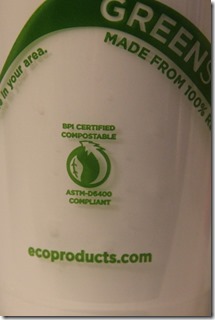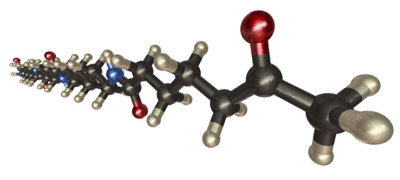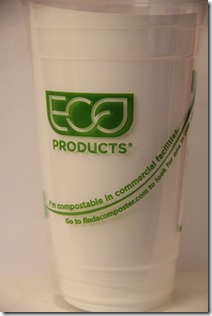I was at Angels Stadium in Anaheim, CA on Sunday when the Angels were playing the Oakland Athletics. My “adult beverage” came in a polylactic acid (PLA) cup. I needed the adult beverage since Bartolo Colon (the 40 year old pitcher for the Oakland A’s) was pitching “lights out” on his way to a complete game shutout (6-0) of the Angels. His nasty sinker stymied the Angels batters…Enough of that sad story.
A couple of interesting items I noticed on the cup. The first thing that jumped out at me was the text “I’m compostable in commercial facilities.” Under that was the phrase “Go to www.findacomposter.com to look for one in your area.” Somebody at Eco-Products got it right.
 Even more astounding was another label that stated “BPI Certified” and “ASTM D-6400 Compliant.” Eco-Products did their homework! Go to www.ecoproducts.com for more details.
Even more astounding was another label that stated “BPI Certified” and “ASTM D-6400 Compliant.” Eco-Products did their homework! Go to www.ecoproducts.com for more details.
The question is: How many fans at Angels stadium on Sunday had any idea what that ASTM D-6400 Compliant even means? of BPI Certified?
There was a big GREENSTRIPE® by Eco-Products that was prominently displayed on the cup. It also stated, made from 100% renewable  resources. It had PLA and the number 7 symbol on the bottom along with the words “compostable.” Covered all the bases correctly. Kudos to Eco-Products for doing a great job promoting composting and getting the details correct.
resources. It had PLA and the number 7 symbol on the bottom along with the words “compostable.” Covered all the bases correctly. Kudos to Eco-Products for doing a great job promoting composting and getting the details correct.
The next thing to think about, was what happened to all those cups when the cleaning crew came through? Did they separate them so they could be composted, where they added to the recycle waste stream, or just simply loaded in the the trash and headed to the landfill?
Well, I was curious so I looked up composters using the findacomposter.com website and found 11 composting facilities within 50 miles of Anaheim, CA. I checked a few of them out and it turns out they were all yard waste compost facilities. It didn’t look like PLA cups could be composted at any of these facilities. I widened my search using google and found 9 industrial compost facilities in the greater LA area that accepted green materials as well as food waste, wood waste, and sludge (biosolids). So there is an appropriate compost facility that could be a repository of the PLA cups at Angels stadium. With about 40,000 fans at each game, I am guessing that’s a lot of PLA cups!


That is a very encouraging post. I’d be interested in whether any of the cups made it to one of the industrial facilities. Separation from the general garbage at the stadium would be formidable – but if the Eco-Products were serious for the long-term, they might invest in dedicated receptacles at the stadium that fans could use.
I hope you do a follow up on this item.
Agreed that there Interesting ”on the cup” info. Most commercial industrial high heat compost operations are no longer accepting PLA based products (in particular the thicker walled ones like cutlery because they don’t usually break down fast enough for the compost cycle (57-60 day cycle) time.
The other serious issue related to the corn that is used to create PLA, today most N American corn is GMO – Genetically engineered with the effect that common bacteria which would usually ingest the corn are confused. I have noted that Sweetcorn kernel and remnants placed in my home composting unit are not bio-degraded for an extremely long period of time. Must now be unattractive food to micro-organisms that in the past have consumed them in a matter of a couple of weeks !
JeffThis is a good start, but a lot more needs to be done in order to get these cups to the right place (an industrial composting facility). I doubt that fans at the game will take this home and make sure they get to the industrial composting facility. The entire process becomes a joint effort between suppliers, vendors, consumers, stadium, stadium staff, waste hauler, and industrial composting facility. It is only through a strong effort and strong commitment from all the parties involved that this get done and done right. It only take one player in the process to “not do their job” and the whole effort was for not. The Green Sport Alliance and the Seattle Mariners are doing it right. The Mariners have an aggressive program in place to divert all waste from the landfill. They are making excellent progress with the use of industrial compostable products throughout their stadium, fan engagement, and active participation from all of the parties involved.